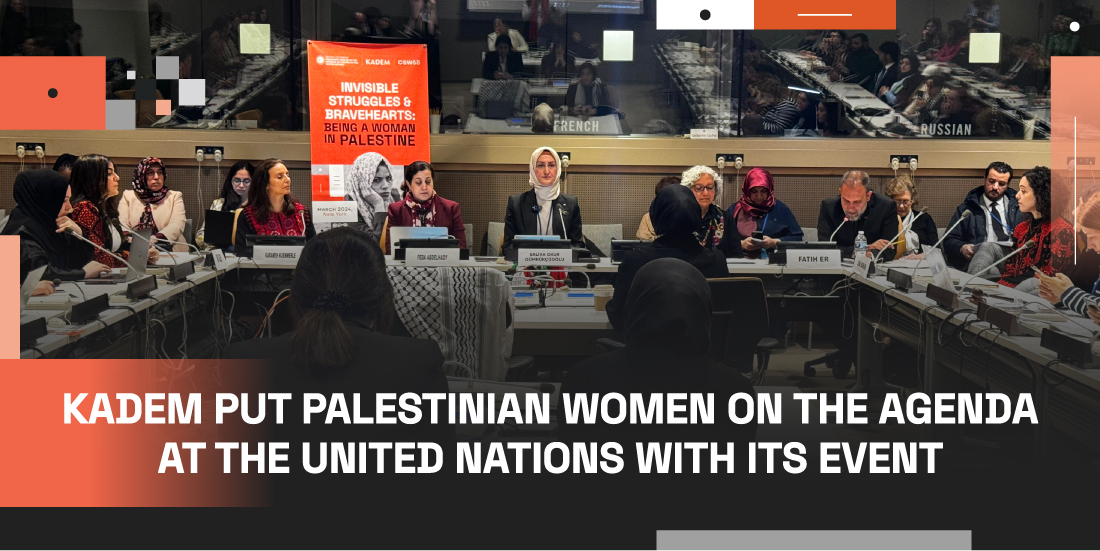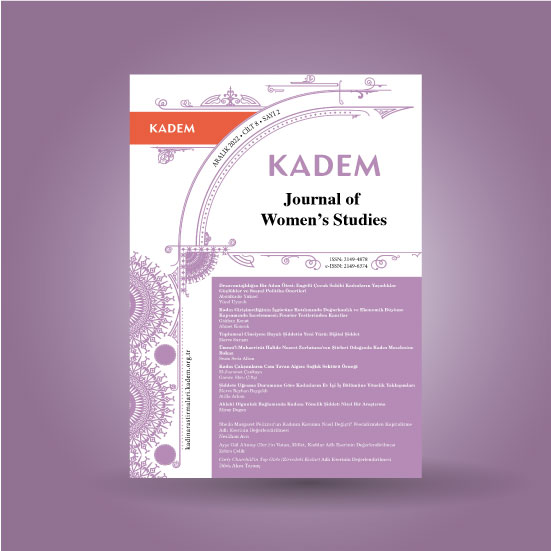KADEM PUT PALESTINIAN WOMEN ON THE AGENDA AT THE UNITED NATIONS WITH ITS EVENT
The outcry of Gaza women echoed at the United Nations!
The Women and Democracy Foundation (KADEM) addressed the courageous women of Gaza in the panel titled “Invisible Struggles and Bravehearts: Being Woman in Palestine,” organized during the 68th Session of the United Nations Commission on the Status of Women in New York.
The panel, held in conference room no 12 of the UN General Assembly Building, began with a short film prepared by KADEM, showcasing messages from women living in Jerusalem, the West Bank, and Gaza.
After the screening, the moderator, Fatih Er, proceeded to read the letter written by Rachel Corrie, who was crushed to death by an Israeli bulldozer in Gaza.
The opening speech of the panel was delivered by Assoc. Prof. Dr. Saliha Okur Gümrükçüoğlu, the chair of KADEM. She began with her speech by stating, “As you are all aware, March is a month dedicated to the women of the world. While we want to delve into more pleasant things about the women of the world, regrettably, we are going through difficult days. We live in a time which is particularly taxing for those with compassionate hearts. We are at a critical juncture where individuals of conscience are questioning the course of events in the world. Indeed, all of us are being tested.”
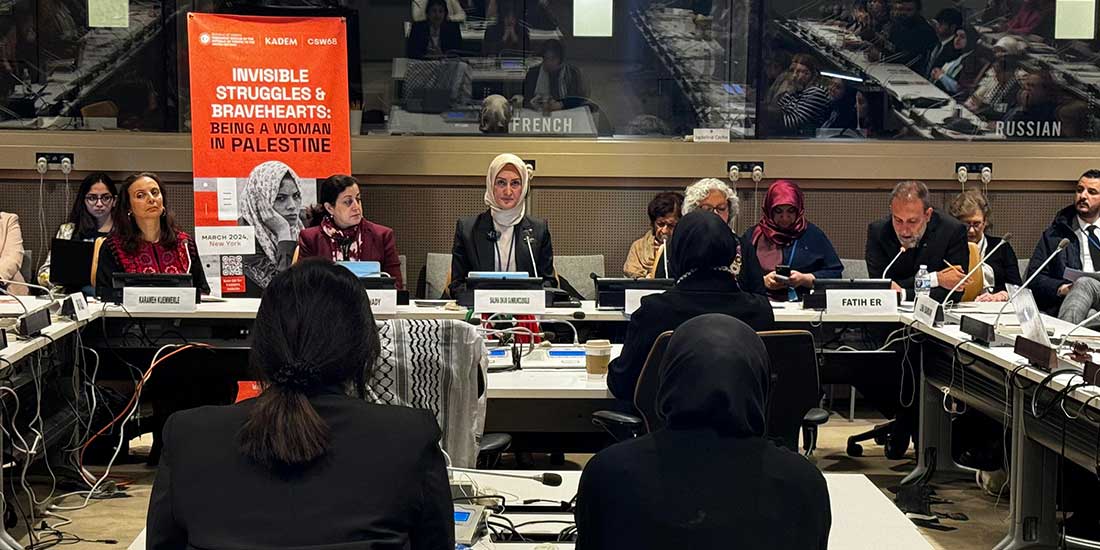
By drawing attention to the present position of the world since the Holocaust, Gümrükçüoğlu highlighted, “Jews endured centuries of dehumanization before facing the annihilation during the Holocaust. This was a profound persecution. Presently, the remnants of this catastrophe persist as a bitter stain on the soul of humanity, as the world is in the dismay of witnessing the endless evil again. Today, the Zionist ideology casts a dark shadow upon Palestine, undermining not only the cherished values of humanity but also the West’s perception of moral and human superiority. Rebuilding trust in the shattered foundational principles of humanity will require considerable time.”
The chair of KADEM continued by stating, “We must not forget that the blockade surrounding Gaza and dividing the West Bank with enormous walls is not merely physical barriers. Beyond this blockade, which remains impervious to convoys and agreements, lies a colonial mindset. Israel is the operator of settler-colonialist practices in our age, serving as an exponent of this ideology. With their support for Palestine, people around the world assert that this ideology needs to end. This is one of the factors that transforms the Palestinian struggle into a universal fight for humanity.”
Answering the question “Why do we call women of Gaza, and of Palestine brave hearts?” Assoc. Prof. Dr. Gümrükçüoğlu said, “Of course the reason behind this is not that the war affects men and children more significantly. Rather, it is because the physiological and psychological effects that war imposes on women have evident influence on men and children. Let me explain with an example: There are almost 50 thousand pregnant women in Gaza. This means 180 births per day. Where do these women give birth? Tent settlements, blood-soaked floors of wracked hospitals, surrounded by corpses, under the threat of guns at checkpoints, in the tents and cars that might be bombed at any moment. How do these women give birth? Without anesthesia, without medicine, without help, without any doctor or midwife, with no privacy and in the face of death.”
Gümrükçüoğlu pointed out the tragedy endured by the women in Gaza, remarking, “Palestinian women carry within their bodies and souls the seeds of Palestinian freedom. A young mother from Gaza with six children had told to our friend visiting Gaza: ‘Two of my children will be killed by Israel, two will assist in sustaining our livelihood, and two will go to school and pursue a life.’ This mindset sheds light on why Israel deliberately targets women and children, and why they seek to dismantle healthcare system.”
The chair of KADEM drew attention to the criminal complaint they submitted to the International Court regarding Israel, providing detailed information on the action and awareness activities they held both domestically and internationally, through its 55 representative offices and youth organizations.
Gümrükçüoğlu concluded her address with the statement, “Our message to the world as KADEM is clear: Humanity must transcend this challenging juncture. We must put an end to the hegemonic system that maintains colonization and disrupts world peace by invading and destroying countries with so-called excuses. As the wheels of this system proceed to turn, we are witnessing our universal values being hollowed. It is the duty of all people around the world to uphold these values, imbuing them with renewed attitudes and perspectives, with universal resilience and hope. As the women of the world, we aspire towards universal peace. We stand in solidarity with the righteous and honorable struggle of Palestinian women.”
The panel moderated by journalist Fatih Er, who has been in Jerusalem and Gaza for many years, featured notable individuals including doctor Karameh Kuemmerle, activist and tatreez artist Lina Barkawi, poet Zeina Azzam, Deputy Permanent Observer of the State of Palestine to the United Nations, Ambassador Feda Abdelhady and Palestinian doctor Safa Salem.
WRITE MY NAME ON MY LEG, MAMA!
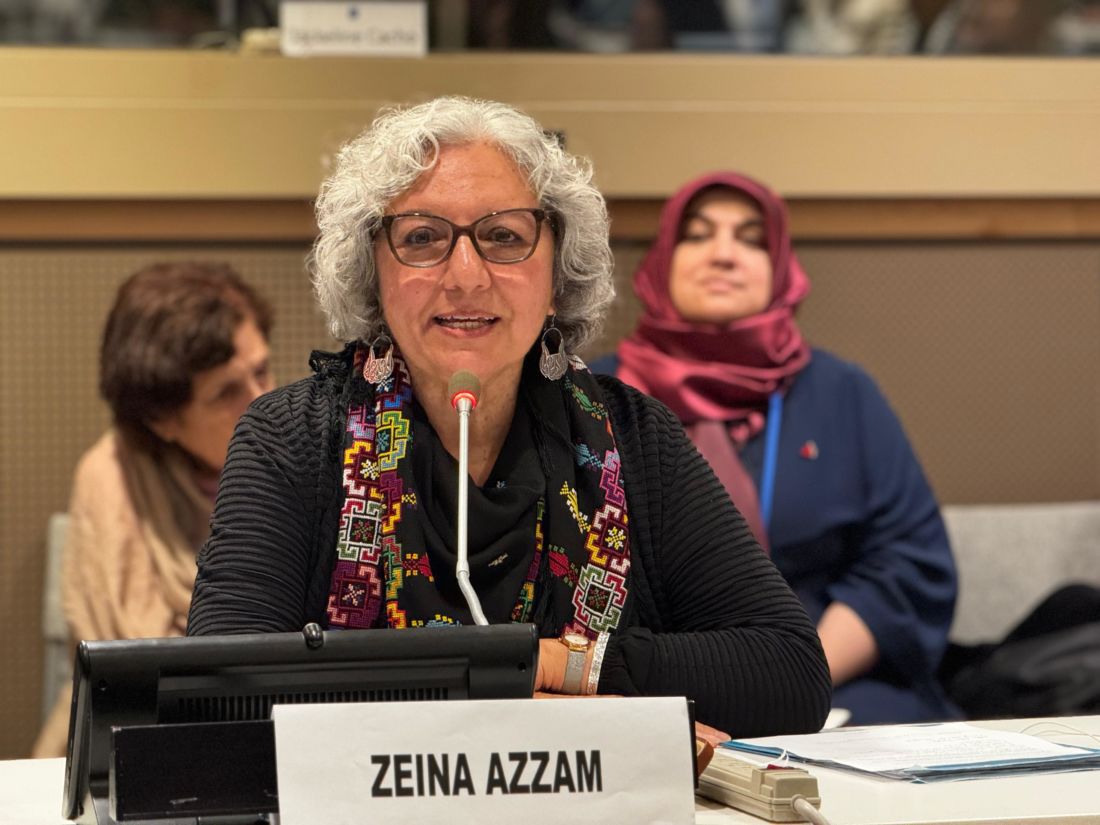
Poet Zeina Azzam delved into the significance of the Palestinian poetry, saying “Our poems transcend mere resistance literature. They encompass themes of social justice, women’s empowerment, identity, social memory, love, family, and all the other universal topics. Our pens are our weapons.” The audience was overwhelmed with tears as Azzam recited her poem titled “Write my name on my leg, Mama!” written for the children of Gaza.
LEAVE EVERYTHING YOU’VE GOT!
Addressing the healthcare challenges in Gaza, Dr. Karameh Kuemmerle highlighted that only 6 out of 36 hospitals in Gaza are operational to a limited extent. “There is no medicine, no hygiene supplies, intubation devices are reused from deceased patients to others. Doctors have to operate on patients without anesthesia in unlit environments. 31 children lost their lives solely because of hunger. We cannot remain silent while our colleagues are targeted, we must raise our voices against this hypocrisy. My call to all people around the world is this: Leave everything, leave everything you’ve got, and do whatever you can to stop this massacre. We need to do this on behalf of humanity.”
THE SPECIAL LANGUAGE OF PALESTINIAN WOMEN: TATREEZ
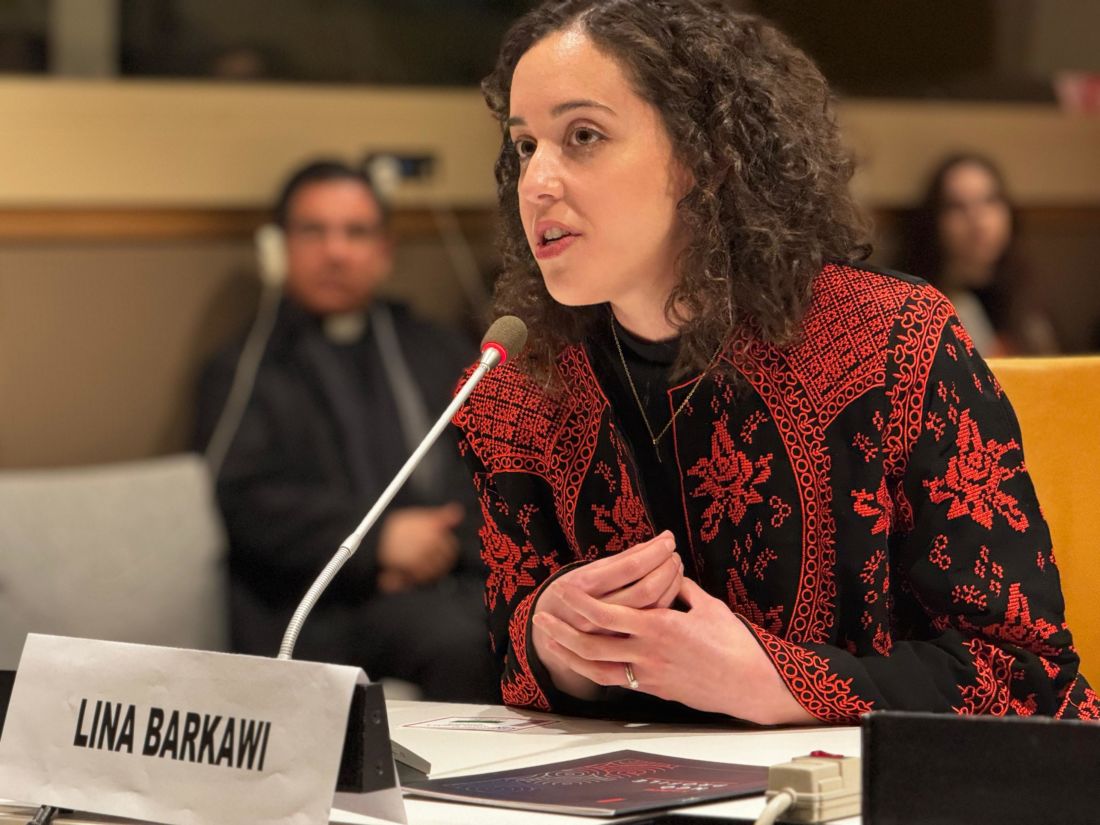
Lina Barkawi, activist and artist of “tatreez”, the traditional embroidery of Palestinian women, summarized her work by stating, “Tatreez serves as a language among Palestinian women, not only for communication, but also for archiving. It is a language through which they chronicle the events and the feelings they experience. After 1948, women and families were displaced to refugee camps. Women there gathered to make tatreez. On the first days of Nakba, tatreez became a way of survival. With the Palestinian flag and symbols were banned, women embroidered our flag onto their garments with tatreez as a form of representation.”
THIS IS A CONCERN FOR ALL OF US!
Dr. Safa Salem addressed the representation and experiences of Arab doctoral candidates in the diaspora. He said, “Palestine is not solely an Arab concern, it is a communal issue, one that concerns us all.”
THE WORLD IS BIGGER THAN FIVE!
Deputy Permanent Observer of the State of Palestine to the United Nations, Ambassador Feda Abdelhady responded to moderator Fatih Er’s question of “Palestinian mission is at the level of observation, not representation. What kind of works is being done to change that?”, saying that “Palestine has the right of having its own land. Despite being occupied, it remains a country, a sovereign state with a territory and the right to participate in agreements. It is actually a member of many organizations, such as the Islamic Development Bank. Furthermore, Palestine’s flag is displayed in the UN. The critical issue here lies in the admission of Israel to the UN and its recognition as a state. The United Nations has lost all credibility.
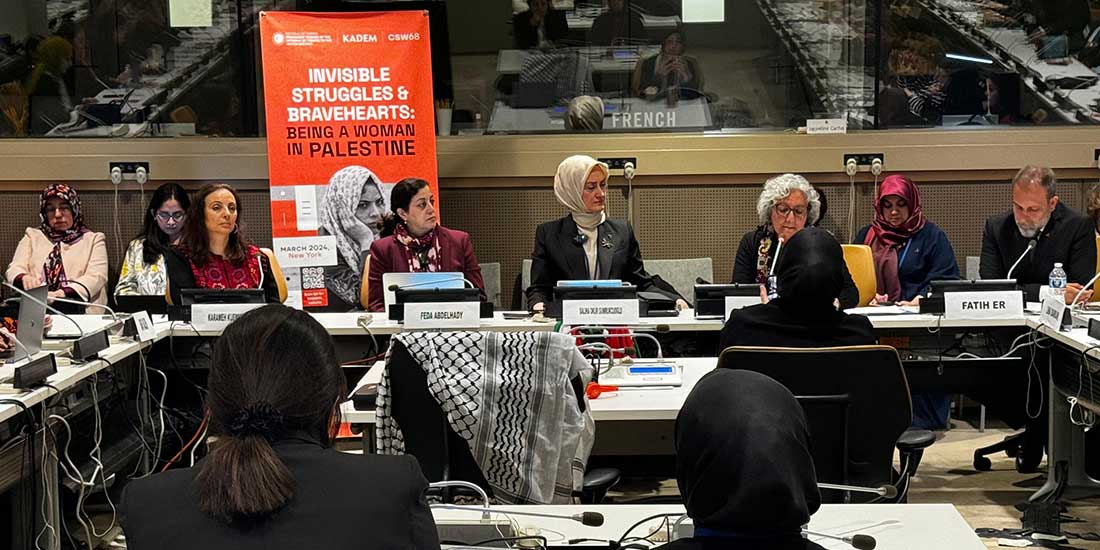
The permanent veto power of the US either must be abolished or restricted. This reform must be brought into force urgently, because as the world nations know, not only the future of Palestine is at risk due to this situation, but much more.
The State of Palestine must rightfully assume its place among the world states. Palestine is a sovereign state, a state which is under occupation.
Zeina Azzam recited the verses of poet Ahmed Dremly.
Nothing can express,
The pain of losing the people who were a main part of my life.
Nothing can erase,
My last look at them from my eyes.
Nothing…
Muslim and Christian Palestinians who live in the diaspora, anti-Zionist Jews and activists around the world attended the event hosted by KADEM in the UN.

